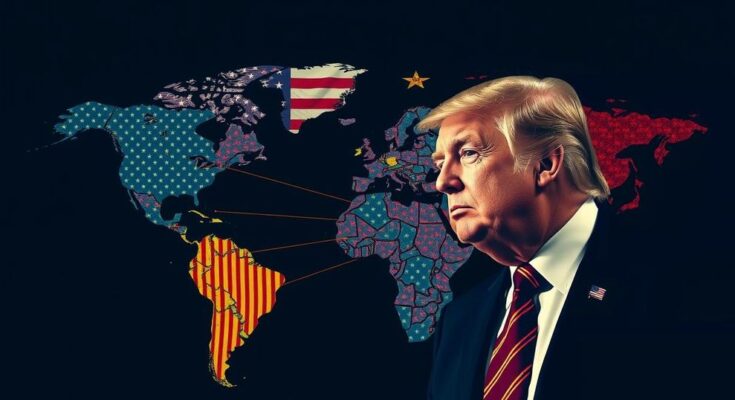Donald Trump’s proposed tariffs on goods from Mexico, Canada, and China have raised alarms among European companies, prompting concerns over potential economic repercussions. With previous tariffs serving as tools for foreign policy leverage, the current situation underscores the complexity of global trade relationships. The interconnected economies may face significant challenges if retaliatory measures are enacted, affecting consumers and industries alike.
Recently, Donald Trump’s comments regarding proposed trade tariffs on goods from Mexico, Canada, and China have raised significant concerns among European businesses. Many companies believed they had evaded the adverse effects of incoming tariffs, finding relief that their markets were not initially targeted. However, Trump’s statements suggested a potential pivot towards these nations as scapegoats for broader economic issues, indicating a return to tariff strategies reminiscent of his presidency in 2016. The announcement outlined plans for a 25% tariff on imports from Mexico and Canada while signaling possible increases on Chinese goods should they not comply with forthcoming demands from the new administration.
Chris Turner of ING expressed caution regarding the absence of immediate tariff threats directed at Europe, noting that European policymakers remain apprehensive of future targeting. The mere possibility of escalating tariffs prompted a decline in shares among European automotive manufacturers, indicating immediate market reactions to the perceived threats. It is expected that any destabilization in trade dynamics could adversely impact the UK’s economy as well, particularly if the U.S. targets Europe directly.
The implications of Trump’s potential tariffs extend beyond initial reactions, as they could lead to retaliatory actions from affected nations. Analysts have noted that such trade conflicts could precipitate broader declines in global economic activity. Should tariffs be fully enacted, American consumers might see significant price increases, adding further strain to their purchasing power. Thus, while certain firms may initially benefit from the tariffs, the overarching economic environment may provide little respite as retaliatory measures can escalate further.
In the context of U.S. trading relations, the dependency on imports for various sectors signals that abrupt tariff implementation could create severe disruptions in supply chains, particularly in industries like automotive manufacturing where cross-border dependencies are paramount. Moreover, the interwoven nature of trade highlights that the ramifications of Trump’s tariffs could extend to every corner of the U.S. economy and beyond.
As Prime Minister Justin Trudeau and other Canadian officials reiterated the vital role of their nation in supporting U.S. energy and trade, it is evident that collaborative discourse with the incoming administration remains crucial amidst these turbulent economic forecasts. The interconnectedness of North American markets demands that trade policies navigate carefully to avoid detrimental impacts on existing relationships.
The article discusses the implications of Donald Trump’s proposed tariffs on goods imported from Mexico, Canada, and China. Tariffs have historically been employed as tools for addressing trade imbalances and achieving foreign policy objectives. In this instance, Trump indicates that these tariffs are a response to drug trafficking issues tied to these nations. The effects of the tariffs are expected to ripple through global markets, particularly impacting European companies and the interconnected supply chains across North America, suggesting a complex web of economic interdependence that could have wide-ranging consequences.
In conclusion, Donald Trump’s recent threats of imposing tariffs on Mexico, Canada, and China have reignited fears of potential economic fallout for not only these nations but also for global markets, particularly affecting European businesses. The looming possibility of trade conflicts could lead to retaliatory tariffs, resulting in heightened consumer prices and disrupted supply chains. As both the U.S. and its trading partners consider their next moves, the outcomes of these discussions may significantly shape the future of international trade dynamics and economic stability across borders.
Original Source: www.theguardian.com




